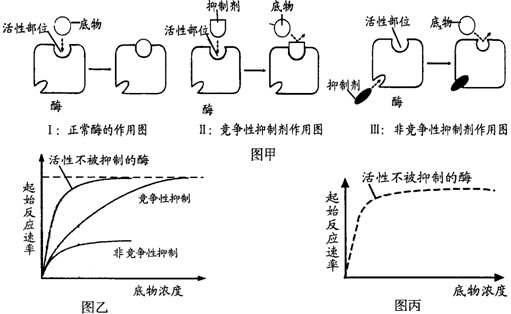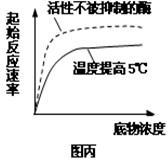在生物化学反应中,当底物与酶的活性部位形成互补结构时,可催化底物发生变化,如图甲Ⅰ所示。酶的抑制剂是与酶结合并降低酶活性的分子。竞争性抑制剂与底物竞争酶的活性部位,非竞争性抑制剂和酶活性部位以外的其他位点结合,从而抑制酶的活性,如图甲Ⅱ、Ⅲ所示。图乙示意发生竞争性抑制和非竞争性抑制时,底物浓度与起始反应速率的变化曲线图。

请据图回答下列问题:
(1)当底物与酶活性部位具有互补的结构时,酶才能与底物结合,这说明酶的催化作用具有________。
(2)青霉素的化学结构与细菌合成细胞壁的底物相似,故能抑制细菌合成细胞壁相关的酶的活性,其原因是___________。
(3)据图乙分析,随着底物浓度升高,抑制效力变得越来越小的是_____抑制剂,原因是______________。
(4)唾液淀粉酶在最适温度条件下,底物浓度与反应速率的变化如图丙。若将温度提高5℃,请在图丙中绘出相应变化曲线。
(1)专一性
(2)青霉素能与这些酶的活性部位结合
(3)竞争性 底物浓度越高,底物与酶活性部位结合的机会越大
(4)

